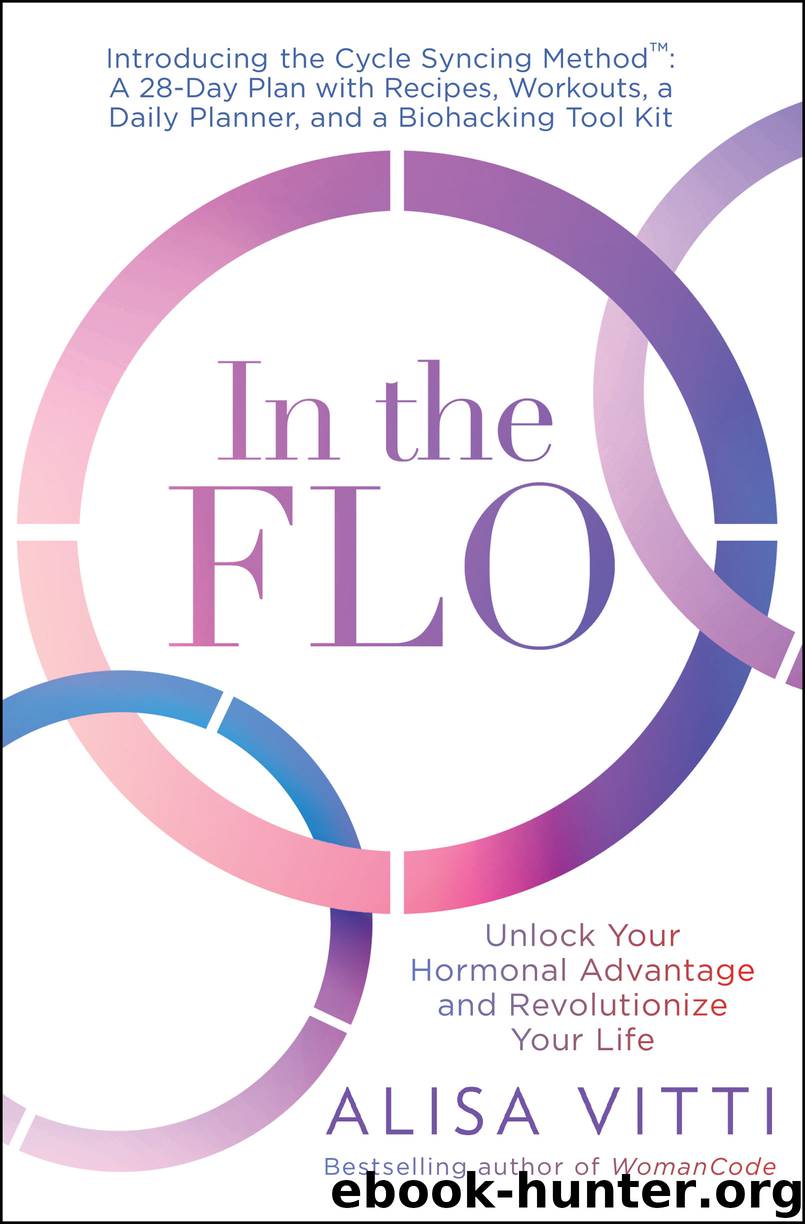In the FLO by Alisa Vitti

Author:Alisa Vitti
Language: eng
Format: epub
Publisher: HarperCollins
Published: 2019-11-24T16:00:00+00:00
Step 6: Address the Emotional Causes of Your Symptoms
Did you know that our emotions, feelings, and the energy we hold can play a part in the development of reproductive health conditions? In Women’s Bodies, Women’s Wisdom, Dr. Christiane Northrup asserts that there’s an emotional-psychological component to menstrual disorders. I have found this to be true with my clients and with myself. And although it’s very important to look at the root causes of conditions from a functional nutrition and biological standpoint, and to go through all of the steps listed here to address those causes, it’s just as important to make peace with some of the emotional issues that may be contributing to your menstrual problems. So far in this book, you’ve seen the biological and neurochemical underpinnings of hormonal dysfunction. You’ve grasped how trying to fit into a 24-hour world without taking your 28-day clock into account has put you at a serious disadvantage, and you’ve discovered how endocrine disruptors and synthetic birth control assault your body and damage your biological systems. Most important, you’ve seen how you can use food and lifestyle changes to put your period problems into remission and help you balance your hormones. Your emotions are the final piece to the hormonal dysfunction puzzle you may want to consider. Emotions are powerful, and they can cause real physical changes. You feel nervous, your hands get clammy. You feel scared, your heart starts to beat faster. You feel anxious, your stomach hurts. Research shows emotions can impact many of our biological systems—causing neurochemical changes, suppressing our immune system, and ramping up our stress response. It’s not surprising that emotions may contribute to your period problems.
I find that emotions also need to be addressed for long-term hormonal recovery. What do I mean? For example, take a look at Sheri. She wanted help because she was experiencing continuous spotting. We had addressed her diet and lifestyle, but the spotting was still occurring. During one conversation she mentioned to me that the spotting had been happening since her father had passed away earlier that year. I suggested that Sheri’s womb was holding her unprocessed grief, resulting in the symptoms, which were a literal weeping from the womb. Once she made that connection, she was able to release her emotions and address her grief, and this symptom pattern disappeared.
Think of your body having a “high heart” where your actual heart is, and a “low heart” where your pelvic basin is; the “low heart” holds on to your deepest emotions, the ones you may not even be aware of. These feelings will remain there until your “high heart” is ready to process them. A health condition like spotting can convey a message of the kinds of emotions being held in the reproductive organs. I see this in many women who are trying to live in perpetual productivity—being in never-ending go mode at work, in relationships, and in motherhood. When you push at work without rest, do what your partner wants but
Download
This site does not store any files on its server. We only index and link to content provided by other sites. Please contact the content providers to delete copyright contents if any and email us, we'll remove relevant links or contents immediately.
The Ethical Slut by Janet W. Hardy(4253)
The Evolution of Beauty by Richard O. Prum(2997)
The Art of Seduction by Robert Greene Joost Elffers(2875)
The Clitoral Truth: The Secret World at Your Fingertips by Rebecca Chalker(2720)
The Happy Hooker by Xaviera Hollander(2694)
A Burst of Light by Audre Lorde(2607)
The Psychology of Human Sexuality by Lehmiller Justin J(2593)
The Book of Questions: Revised and Updated by Gregory Stock Ph.d(2572)
Women on Top by Nancy Friday(2563)
The Arts of Seduction by Seema Anand(2507)
Mating in Captivity by Perel Esther(2436)
The Modern Alpha Male: Authentic Principles to Become the Man You Were Born to Be: Attract Women, Win Friends, Increase Confidence, Gain Charisma, Master Leadership, and Dominate Life - Dating Advice by Patrick King(2353)
The Ultimate Guide to Anal Sex for Women by Tristan Taormino(2299)
The Coregasm Workout by Debby Herbenick(2272)
She-ology by Sherry A. Ross MD(2165)
Make Love Not Porn by Cindy Gallop(2108)
The Manual: What Women Want and How to Give It to Them Paperback by W. Anton(2083)
101 Nights of Great Sex by Laura Corn(2079)
The Hite Report on Shere Hite by Shere Hite(2066)
